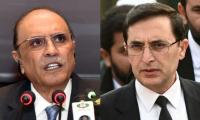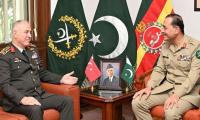As many as 46.4 million children have so far been vaccinated against measles and rubella during the first six days of the national drive and not a single child has faced even a mild adverse effect following the vaccination, said experts on Saturday as they urged the parents to get all their children between nine months to 15 years vaccinated in the drive even if they had already had anti-measles vaccine.
Health experts at a press conference at the Karachi Press Club on Saturday maintained that the rubella infection may cause mild symptoms or even no symptoms in most people but it could cause serious problems for unborn babies whose mothers become infected with this virus during pregnancy. They advised the parents to get their children vaccinated against rubella and measles during the ongoing vaccination drive.
“Rubella vaccine is a blessing for the girls as it prevents them from an infection which can cause problems for their unborn babies after marital life. We strongly recommend the parents to get their children from 9 months to 15 years of age to get vaccinated against measles and rubella even if they had received the measles vaccination before,” Prof Jalal Akbar, the Pakistan Paediatric Association (PPA) Sindh president, told the news conference.
Accompanied by PPA office-bearer Prof Dr Khalid Shafi, Unicef Communication Specialist Suneel Raja and others, Prof Akbar said Pakistan had launched the world’s largest anti-measles and anti-rubella campaign with a target of over 91 million children and billions of rupees were being spent on it, so it was the responsibility of the parents to respond to the national cause.
He maintained that over 82 countries had eliminated measles and rubella from their soils with these time-tested vaccines and recently 30-35 countries had conducted mass vaccination campaigns to prevent their children from these ailments.
“Some parents are confused and are not getting their children vaccinated during this campaign. We want to let them know that these vaccines are extremely safe as not a single child in over 40 million has faced any adverse effect due to vaccination,” said Dr Shafi.
To a query, he said the Measles Rubella initiative launched in 2001 was a global programme committed to ensuring that no child died from measles or was born with congenital rubella syndrome. He added that the World Health Organisation’s measles elimination strategy included a combination of high routine coverage and high quality campaign.
The Unicef communication specialist said that so far over 8.89 million children had been vaccinated in Sindh against measles and rubella. He added that the target was to vaccinate 18.68 million children in the province in the 12-day campaign.
Responding to a query, he said efforts were under way to digitalise all the vaccination centres in the province being run by the Expanded Program on Immunisation. Soon, the location of all the vaccination centres in the province could be located with smart phone apps, he added.
This representational image shows a woman touching a dead body's legs. — APP/FileThe woman killed on Wednesday in...
The University of Karachi entrance gate. — APP/FileThe role of educated mothers is crucial for the development of...
Secretary Information Department Nadeem-ur-Rehman Memon. — Facebook/Umerkot - Gateway to TharSecretary Information...
Commissioner Karachi Syed Hasan Naqvi chairs a meeting to assess the preparations for the upcoming 29th International...
Sindh’s chief secretary Syed Asif Hyder Shah chairs a meeting with the National Highway Authority on April 18,...
Bakheet Ateeq Al-Remeithi, the Consul General of the Emirates speaks during an event in Karachi on Dec 1, 2023....







